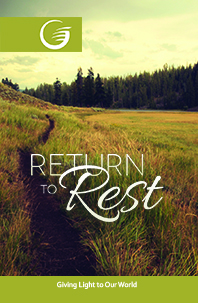
Return to Rest
$6.99
Return to Rest
Years ago television stations played the national anthem and signed off sometime after midnight. No more. These days, programming fills the wee hours of the morning. Anyone awake at those hours can be pummeled with unending news, weather, and/or infomercial pitches for gadgets no one never knew were needed. Even in small cities, giant superstores open their doors round the clock. Increasingly, we live in a 24/7 world.
Business hours are busier than ever. Multitasking is the name of the game. Even on the road, we can take or make phone calls, message an uncle in Chicago, check on stock prices, receive news updates, learn the scores in yesterday’s rugby match in New Zealand, and download music or video on our smartphones.
For many of us, eight-hour days at the office have become every-waking-hour days where the office, business, and the world invade our homes. Eventually we realize that we need rest—not total inactivity, but a change of pace. We need a change from endless concerns about next quarter’s bottom line—a change to things both timeless and eternal. A change, yes, to love, and family, and our place in the world. “The unexamined life is not worth living,” wrote Socrates, and increasingly we know this to be true. We work and plan, strive and acquire, but to what end? So long as we allow ourselves to be mesmerized by the streams of data that fill the air all around us like an invisible smog, we will not pause and contemplate the truly important issues.
Business publications like The Wall Street Journal have called for—can we believe it?—a return to a Sabbath. In an editorial, American journalist Mollie Ziegler Hemingway puts it this way: “The flip side to the prosperity we enjoy is that we have lost our day of rest for another day of consumption. The pace of commerce and technology provide unheard of options for ignoring family, religion and rest—not just on the Sabbath but every day of the week.”*
The Remedy
The Sabbath offers exactly the antidote we need to counter today’s information overload and anxiety disorders. The Sabbath provides a refuge, a rest, a respite from the constant activity and endless barrage of stimuli.
The Bible tells us that God built our need for rest—and the remedy—into the very fabric of creation. God “blessed the seventh day and made it holy, because on it God rested from all his work that he had done in creation” (Genesis 2:3). By resting from all the work that He had done, God provided a model and example. In the Ten Commandments, He makes this example specific and binding: “Six days you shall labor and do all your work, but the seventh day is the Sabbath of the LORD your God” (Exodus 20:9-10, NKJV). Note that neither text says, “work six days out of seven, and rest on one.” Rather, each is explicit that the seventh day is the Sabbath. The seventh day, not a seventh day—and that day is Saturday.
Saturday? We may have been taught that God gave the Saturday Sabbath at Sinai only for the Jews. If that’s true, then not killing and not stealing would also be only for the Jews. Some claim that the cross ended the claims of the Sabbath. Once again, that would mean we’re free to murder and steal—but no one believes that. Some have taught that we worship on Sunday in honor of the Lord’s resurrection. Certainly it is important to remember the resurrection, but the Bible never tells us to remember it.
The Bible does tell us to remember His death (1 Corinthians 11:24–26). This is a striking parallel to the way the Ten Commandments tell us to remember the Sabbath. Further, we discover that Jesus rested in the tomb only one full day, on the Sabbath. Rather than abolishing the Sabbath, Jesus’ death reinforces it. As He had rested from the work of creation on the seventh day of Creation week, Jesus rested from His work of redemption on the seventh day of redemption week (commonly called Passion Week).
Most of us don’t like the ideas of commandments or obedience, but in this case especially, this dislike is foolish and unnecessary. Imagine that a doctor told you to take a vacation, and then revealed that he had a vacation designed to meet your deepest needs. This analogy describes the Sabbath. Jesus himself said, “The Sabbath was made for man, not man for the Sabbath” (Mark 2:27). The Sabbath is not an arbitrary hoop for us to jump through—we have enough of those the other six days—but a rest tailored to meet our needs.
Special Day, Special Rest
Why not Sunday or Tuesday? Why Saturday? The creation story in Genesis tells us that “God blessed the seventh day and made it holy” (Genesis 2:3). What does it mean to make something holy? When Moses stood in front of the burning bush (Exodus 3:1-5), he stood on holy ground. What made it holy? The presence of God. God makes the Sabbath holy by being present on that day in some special way.
“Wait a minute,” we may say. “Isn’t God present on every day?” Yes, that is true. It is also true that God is present everywhere; but God didn’t require Moses to remove his shoes everywhere—only at the burning bush. Just like the Sabbath, God was present at the burning bush in some way that differs from the way He is present everywhere else. Those who set aside Saturday, the seventh day, to rest from their everyday pursuits and meet with their family and with God can attest that humans truly can experience Him in a special way on that day.
Why not try keeping the Sabbath? A rest is waiting for you. If you would like to explore the possibilities of the Sabbath, contact us (see back panel). Those who live nearby would be glad to share the Sabbath with you.
*https://www.wsj.com/articles/SB118188016993336540
Unless otherwise indicated, Scripture quotations are from the ESV® Bible (The Holy Bible, English Standard Version®), copyright © 2001 by Crossway, a publishing ministry of Good News Publishers. Used by permission. All rights reserved. Scriptures marked NKJV are taken from the New King James Version®. Copyright © 1982 by Thomas Nelson. Used by permission. All rights reserved. Cover image: ©www.unsplash.com.
192 in stock
Each package contains 100 tracts.
Dimensions: 4.25 x 2.75 x 1.5 inches

